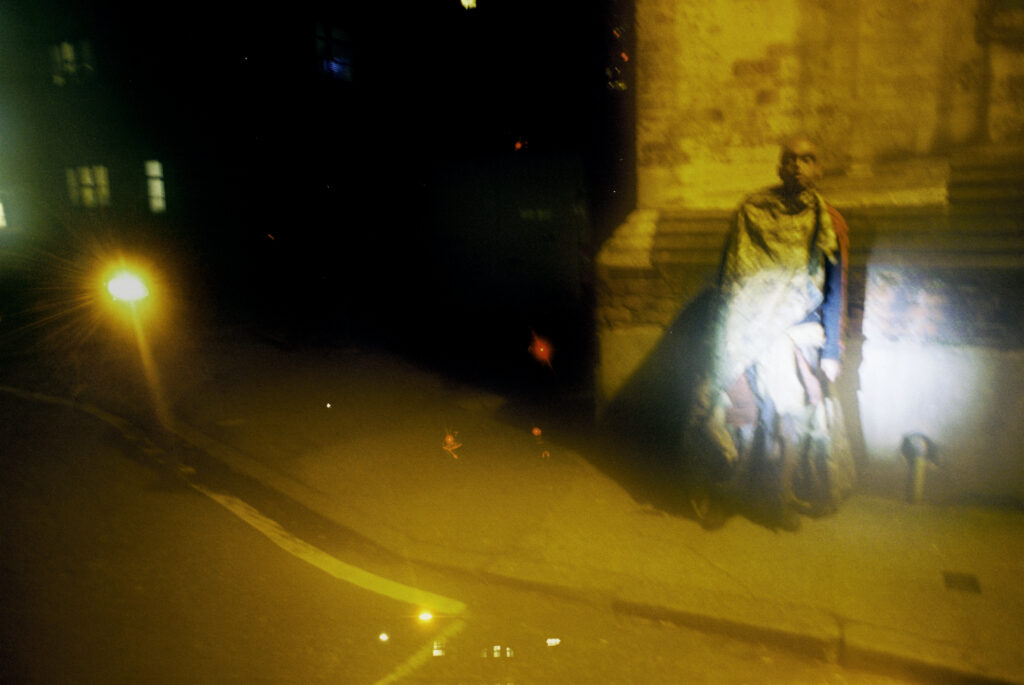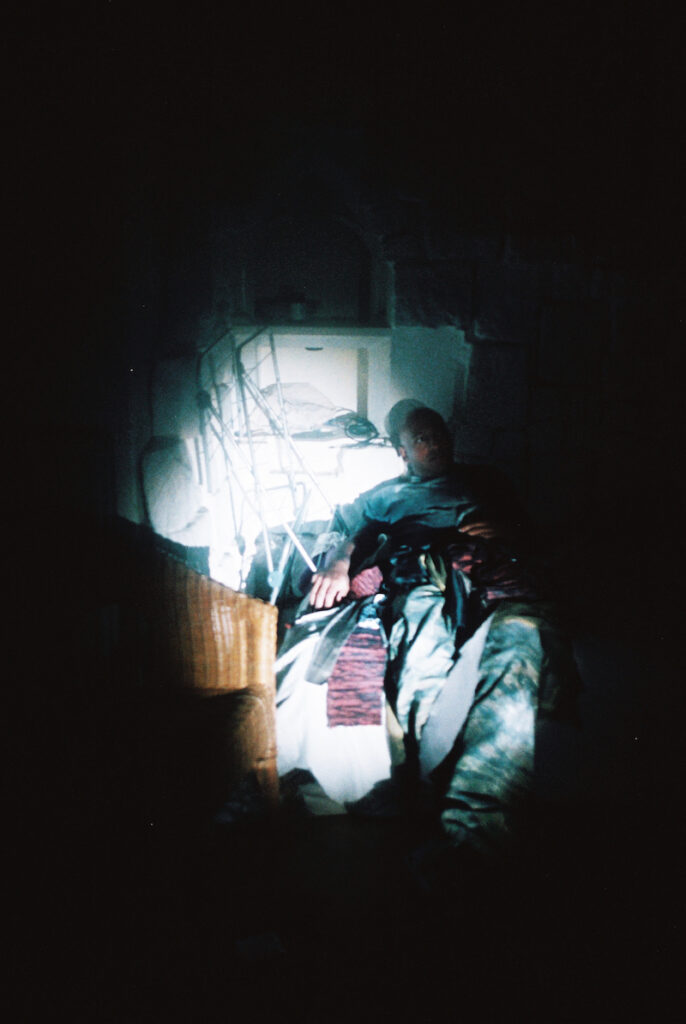Driven by highly frenetic yet fluid complexes of sounds which self-evolve, overlap and collapse into disarray, Acolytes’ music manipulates lo-fi hybrids that move wildly through moments of chaos. Across a handful of records, London-based producer D. Shan, who is behind the project, restructured, reversed and layered glitchy off-beat rhythms and loops with intentionally jarring outcomes, drawing his listeners into a chasm with this seemingly hectic methodology.
Acolytes’ new album, Rupture, was released on Alter, the London-based label run by Luke Younger aka Helm [see zweikommasieben #13], as was his self-titled debut album back in 2014. Flora Yin-Wong caught up with Shan for zweikommasieben to chat about automation, influences and moving from London to Berlin and back again.
Flora Yin-Wong Rupture was described as a self-cannibalistic piece of work. Across seven tracks there are running motifs and samples that resurface with new contexts and purposes. How was the record formed?
D. Shan It’s hard to talk about, because it’s more about my state of mind when I made it. It has more to do with the headspace I was in a couple of years ago, where things would just happen one after the other without any time to settle, and you are just left with a sense of nausea. I wanted to have this sense of a record that’s eating itself from the inside out. A lot of the samples are repurposed from the first LP, a few tracks on there are fed back into themselves—“Rhetoric 2010 (Dub)” is in “Aneurysm” and “Autocannibalism Loop,” and restructured a few times. I never wanted the first side to sound like it settled at all; I wanted the transitions to be jarring. This is the first time I’ve heavily processed samples. It was more of an experiment.
FYW You have a background in coding and programming, right? How much of that goes into your music?
DS I mess about with SuperCollider and Tidal, but I wouldn’t say that’s a big part of my practice. I’m not massively invested in the aesthetic of computer music, or this idea of being informed by new forms or structures through exploring what coding music can show me. I use these tools as an extension of what I’ve been doing already. I mainly use the computer to hook up to Ableton, since it forces me to make music that conforms to a grid. All the plug-ins, the delays and granular stuff are synchronized to the grid and the tempo the music is playing at. I am feeding chaotic, out-of-time music into it and these plug-ins “correct” it in this weird way, so even though everything sounds like it’s falling apart, it gives it a sense of still being a coherent piece of music.
FYW Speaking of chaotic out-of-time music, could you elaborate on how you use chaos as a strategy for composing music—or even life?
DS I like the aesthetics of chaos—like broken rhythms, etc. I think about the composition quite a lot, so I’m not trying to say chaos is part of my process. “MXE666” is the only track where I didn’t know what was going to happen when I fed the drumming back on itself through the synth, that is to say, it’s the only really chaotically created, random track.
FYW Do you feel you have a certain aesthetic that you are drawn to? Or do you feel that is irrelevant to your music?
DS I guess so. I hadn’t really thought about it before, but it has been mentioned to me at some shows I played. I think most of what I’ve been doing is really caning the SuperCollider patch used for collage and warping. I’ve figured out what rhythms and vocal samples work best with this patch, and I guess subconsciously, chosen those types of sounds on samples. I don’t really find having a defined sound very exciting, though, and don’t intend for my music to be married to a particular sound or aesthetic; but I think maybe I have developed one subconsciously.
FYW You mentioned SuperCollider. Are there other sound-generating processes you are interested in?
DS I’ve been using SuperCollider for about six years and have started getting into Overtone and Tidal recently. However, it isn’t really about sound generation or the sounds of these tools themselves. I just felt like it was taking me ages to write new music, so it was better to automate it.
FYW Looking at the mixes you’ve made for Blowing Up The Workshop and Bus Editions suggest your influences are quite wide—what do you feel have been the greatest references for you musically, or otherwise?
DS I guess my main influences have been from the experimental and noise scenes of a few years ago, but I wouldn’t say I’m tied to any scene or have one big influence. I’m just into what’s around.
FYW What is around then?
DS I’ve always thought anything can be played—a conversation, a sample from something, an edited track or whatever. I guess it’s not so radical anymore with what’s happening at the moment with the sampling and editing culture in modern music. I think music has to be ever-changing and be representative of what’s going on around us. It’s very dangerous to fall in love with a particular musical subculture, to revere it and ultimately think that it’s sacrilege to do anything else but imitate the visual or sonic aesthetic of that one scene. A lot of music has gone far in the opposite direction, where everything is just reference points and doesn’t really say much.
FYW How do you keep your music evolving, considering this?
DS I used to play in bands and was engaged more in the noise and experimental scene. Though I only started making music seriously around five years ago. The LP I made before was more of a messy, improvised lo-fi record. I was into how it was constructed… I was interested in the structure of the songs, tracks and transitions. On the two Alter LPs, I thought a lot about structure and how stuff would work as an album. I’m not sure it has translated that well to live shows though.
FYW How do you mean?
DS I have started to let myself go with the tracks and composition on live performances recently, and just let happen what happens.
FYW This approach can be a tough one for collaborators, I can imagine, yet you’re working with different people. Recently, you played an improv show with Alobhe for Alien Jams at Cafe Oto. How did that go?
DS I’m quite into Alobhe’s stuff. She has an uncompromising attitude to DJ sets and live performances. She’s also doing some really cool stuff with tempo shifting in the middle of tracks and DJ sets, and her live performances are really chaotic. I’m really open to working with people in the future, as making music by yourself can be really boring.
FYW Do you feel your live performances are developing over time and how do you respond to the material or feedback being generated from the shows?
DS It’s really interesting, the feedback. Your music isn’t really what you think it is, but what other people, who hear it, say it is.
FYW Being from the UK, and London in particular, has the local music community informed your work over time?
DS I’m really into the music scene here. I’m very into the fact that there are a bunch of people here who have their own sound, and even though they are part of a scene, you don’t seem to get situations where you can’t tell who made what. I think there’s a real sense of individuality in many people’s music over here. That’s what has informed me most. At the moment, though, I’m very into what Lolina and Felicita are doing as pure composers. And also stuff like Oxhy and his crew Xquisite Nihil, for showing me that computer music can be lo-fi and trashy.
FYW You relocated to Berlin for a bit. What was that experience like for your mindset and music making?
DS I really needed to get out of London for a bit, it was doing my head in. Berlin was cool for a bit, but in my experience, being there for a short time, was that it was Disneyland for expats. I felt no real connection to the city or had any idea of life there beyond this bubble. I enjoyed the music scene, but felt there was a bit of a hierarchy with who got to play. It also felt like there was a lot of focus on people playing music that doesn’t really deviate from the entrenched sounds in the various music scenes. It seemed like it got in the way of any real innovation. But like I say, I wasn’t there for very long, so don’t really think I can comment on life in Berlin.
—
Haunter Records will publish Acolytes’ Stress II on March 13, 2020. The interview above was originally publish in the 18th issue of our print magazine; grab a copy over at Präsens Editionen.

